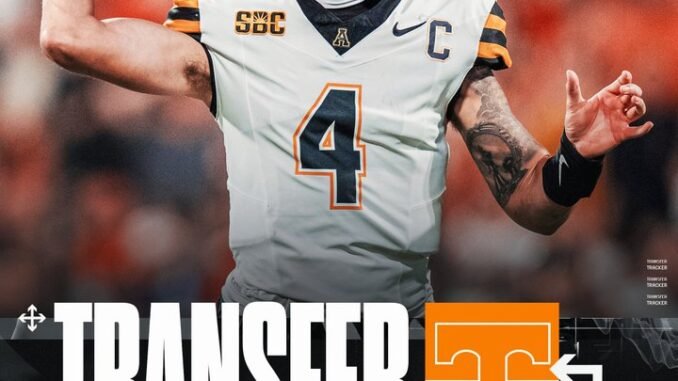
In the boldest—and perhaps most controversial—move of the offseason, the University of Tennessee has reportedly offered a staggering Name, Image, and Likeness (NIL) deal to one of the nation’s top quarterback prospects, sending shockwaves across the Southeastern Conference (SEC) and reigniting heated debates about the direction of college football.
Sources say the deal, which rivals some NFL rookie contracts, is aimed at landing a five-star quarterback from the Class of 2025, whose name is being kept confidential due to recruitment rules. While the identity remains under wraps, insiders claim he’s a generational talent with offers from Alabama, Georgia, LSU, and USC, and Tennessee is hoping to outbid everyone—literally.
The move has drawn everything from praise to ridicule, with some calling it visionary and others labeling it “desperate”. One thing’s for sure: the arms race for elite talent in the NIL era has reached a new level, and Tennessee just fired a cannon shot.
The NIL Explosion: How Did We Get Here?
Just a few years ago, this kind of headline would have been unthinkable. But the 2021 Supreme Court decision allowing college athletes to profit from their name, image, and likeness fundamentally altered the recruiting landscape.
No longer bound by the old amateurism rules, top players are now negotiating six- and seven-figure deals before they ever step foot on campus. It’s a free market—and Tennessee appears ready to pay top dollar.
“This isn’t recruiting anymore. This is an open auction,” said a former SEC coach familiar with the current environment.
And Tennessee isn’t alone. Programs like Texas A&M, Miami, and Oregon have all made headlines for aggressive NIL strategies. But few have gone as all-in—or as publicly—as the Vols have now.
The Quarterback in Question
Though the player hasn’t been officially named, speculation is rampant. Multiple insiders point to a Southern California-based dual-threat quarterback ranked in the national top five, whose arm strength, mobility, and football IQ have drawn comparisons to a young Caleb Williams.
The quarterback recently visited Tennessee’s campus, sparking a wave of online chatter. Photos from the visit—private jet, luxury hotel, and a meet-and-greet with prominent boosters—have only added fuel to the fire.
And according to sources close to the situation, the proposed NIL deal includes:
- A multi-year endorsement contract with a national apparel brand
- Access to luxury housing and transportation
- Revenue-sharing opportunities from jersey sales and digital content
- Upwards of $3.5 million in guaranteed compensation
Tennessee’s Gamble: Desperation or Determination?
Critics of Tennessee’s aggressive pitch are calling it a “Hail Mary” play—a desperate attempt to stay relevant in a conference that’s been dominated by Georgia, Alabama, and LSU for the better part of a decade.
While head coach Josh Heupel has brought some stability and offensive fireworks to Knoxville, the Vols have yet to return to true national contention. With the College Football Playoff expanding and the SEC welcoming Texas and Oklahoma in 2025, the pressure to deliver elite results is higher than ever.
“If you’re not stacking elite QBs, you’re falling behind,” said ESPN’s Paul Finebaum. “Tennessee knows that. They just happen to be more upfront about the money.”
But not everyone’s convinced it’s a sound strategy.
“You can’t buy culture,” said a rival SEC assistant. “You bring in a teenager with millions guaranteed and no track record in the SEC? That can fracture a locker room.”
Still, Tennessee’s boosters seem willing to bet on the upside—and are reportedly pooling resources from multiple NIL collectives, including the highly active Spyre Sports Group, to make it happen.
SEC Reaction: Raised Eyebrows and Quiet Panic
Across the SEC, Tennessee’s move has sparked mixed reactions—from envy to concern to flat-out frustration.
Several coaches, speaking anonymously, worry the league is heading into unsustainable territory, where only the wealthiest and most aggressive programs will survive.
“It’s not recruiting anymore—it’s contract negotiations,” said one veteran SEC recruiter. “And that’s dangerous.”
There are also whispers that the NCAA—despite its largely hands-off approach to NIL—may eventually tighten regulations around inducements and transparency. Whether that comes in time to affect this deal is unclear.
At the same time, some programs are quietly rethinking their own NIL strategies, unsure whether to match Tennessee’s energy or find alternative ways to stay competitive.
“This is a line in the sand,” one SEC insider said. “You’re either playing this game or you’re getting left behind.”
The Fan Reaction: Vol Twitter vs. Everyone
Unsurprisingly, Vols fans are loving it. Social media has erupted with hashtags like #NILMafia, #BankOnRockyTop, and #LetTheBigOrangeEat.
“Y’all mad because we playing chess while the rest of y’all still watching SEC Network reruns,” one fan tweeted.
Memes have taken over X and TikTok, with fans portraying Tennessee boosters as stock market tycoons and Heupel as a Bond villain with a blank check.
But outside of Knoxville, the reaction is more cynical.
“This is what happens when your trophy case is dusty,” posted a Georgia fan account.
“All that money, still won’t beat Bama,” joked another.
Still, the sheer buzz around the situation may prove its own kind of win for Tennessee, especially if they ultimately land the prospect—and convert the hype into hardware.
Final Thought: A New Era Has Officially Arrived
The Tennessee story isn’t just about one school, one quarterback, or one checkbook. It’s about the new college football—where talent acquisition is part recruiting, part business deal, and all high-stakes drama.
Whether this gamble pays off remains to be seen. The quarterback hasn’t committed. The boosters haven’t finalized their bids. And the competition is far from over.
But one thing is clear: Tennessee just changed the NIL conversation again. And in doing so, they’ve made themselves one of the most watched—and polarizing—programs in the country.
Love it or hate it, the game has changed. And the Vols aren’t just playing—they’re going all in.
Leave a Reply